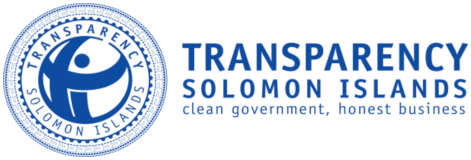
Transparency Solomon Islands (TSI) expresses deep concern over recent developments surrounding the issue of sufferance wharves and the growing reports of ministers and high-level politicians implicated in deals that allow businesses to interfere and influence government decision-making. Such interference deeply undermines the integrity of our laws and the integrity of political leadership in Solomon Islands.
The relationship between government and business is undeniably symbiotic. Businesses require laws and opportunities that enable economic growth and trade, while governments facilitate as well as rely on businesses and the population’s economic activities to deliver growth and outcomes for the nation.
However, what we see in the Solomon Islands today is not a healthy partnership for progress. Instead, we see ministers and individuals allegedly making side deals with businesses with the full intention of pocketing money for their own personal gain.
Transparency International’s 2021 Global Corruption Barometer (GCB) survey shows such realities. The survey revealed 97% of people viewed corruption as a major problem in the Solomon Islands government. Among respondents, 55% believed that most or all members of parliament were corrupt, 45% held the same view of prime ministers, and 28% said the same of business executives.
The issue becomes more concerning in light of recent allegations and reports surrounding the former Minister of Finance and Treasury and the Cabinet’s decisions regarding the suspension of sufferance wharves.
The connection of the former Minister of Finance to Leroy Port, one of the three approved ports for importation of goods in the suspension letter, and the Cabinet’s alleged link to businessmen with vested interests in keeping the sufferance wharves operational, reveals serious issues in the integrity of the country’s institution and its political leadership.
What is most alarming is that influence did not stem from one side alone – business interests were actively at play on multiple sides. There was no “good guy” in this story; rather, it is a story of how our leaders are engaged in a race to see who can be the most corrupt. And it is a story that the people of Solomon Islands are already well aware of.
This is exemplified in the 2021 GCB report which found 60% of participants felt companies in Solomon Islands frequently used money or connections to secure government contracts. These findings confirm what ordinary people experience daily: companies exploiting political connections for profit, at the expense of the public good.
Corruption harms everyone. When companies use money or connections to influence politics, it causes lost revenue, higher prices, fewer services, and erodes public trust in institutions. Such corruption can take many forms, such as bribery, political interference, rigged contracts, or breaking laws and leads to serious consequences. The consequences of such corruption include unsafe products, environmental damage, tax avoidance, and misuse of public funds. As a result, essential services like healthcare and education suffer, and it is the citizens who will bear this cost.
Corruption through undue business influence on political leadership and their decision-making continues to be a big problem for Solomon Islands.
In the Solomon Islands, however, weak enforcement and limited accountability leave us especially vulnerable to exploitation by foreign companies seeking profit at the people’s expense. Many of these companies, though based in countries ranked highly on Transparency International’s Corruption Perceptions Index, have been implicated in major scandals abroad. This shows that integrity at home does not necessarily extend to their operations overseas.
TSI calls for greater transparency and accountability in government decision-making. Officials must disclose their personal business interests and connections as required by the Leadership Code Commission (LCC). Under the Leadership Code Act, all members of parliament are legally obliged to declare their financial and non-financial interests, and failure to comply is punishable by fines or imprisonment.
However, stronger enforcement and tougher penalties are needed to ensure these declarations are made. Allowing leaders to ignore these obligations enables corruption to flourish, costing Solomon Islands valuable public funds that should instead be used for the country’s development.
Moreover, TSI also urges LCC to make these personal interests public by publishing all declarations made by leaders under the Leadership Code. Making this information public would increase transparency and enable the public to hold government officials accountable, helping prevent and reduce corruption overall.
TSI therefore emphasises the urgent need for accountability measures and the strict enforcement of anti-corruption laws. Government officials must face real consequences for decisions made for personal gain rather than the national interest.
Equally, companies, especially those large foreign corporations must be held accountable for their actions. Without such accountability, they are left in a powerful position to dictate legislation and secure unfair advantages, often at the expense of our people’s wellbeing.
The people of Solomon Islands deserve leadership that upholds integrity, transparency, and accountability. TSI stands firm in its commitment to exposing corruption and advocating for reforms that protect the public interest.
